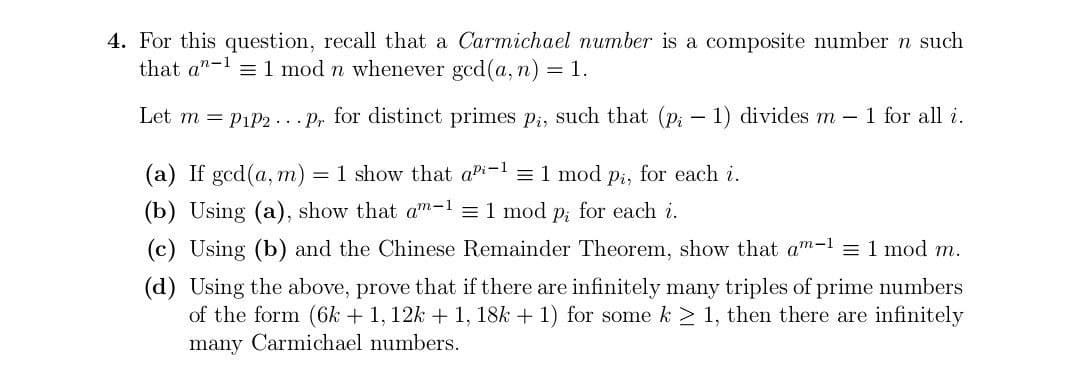For this question, recall that a Carmichael number is a composite number n such that an-11 mod n whenever ged(a, n) = 1. Let m = P1P2. pr. for distinct primes pi, such that (p:- 1) divides m - 1 for all i. (p₁ (a) If ged(a,m) = 1 show that api-1 = 1 mod pi, for each i. (b) Using (a), show that am-1 = 1 mod p; for each i. (c) Using (b) and the Chinese Remainder Theorem, show that am-1 = 1 mod m.
For this question, recall that a Carmichael number is a composite number n such that an-11 mod n whenever ged(a, n) = 1. Let m = P1P2. pr. for distinct primes pi, such that (p:- 1) divides m - 1 for all i. (p₁ (a) If ged(a,m) = 1 show that api-1 = 1 mod pi, for each i. (b) Using (a), show that am-1 = 1 mod p; for each i. (c) Using (b) and the Chinese Remainder Theorem, show that am-1 = 1 mod m.
Elements Of Modern Algebra
8th Edition
ISBN:9781285463230
Author:Gilbert, Linda, Jimmie
Publisher:Gilbert, Linda, Jimmie
Chapter2: The Integers
Section2.5: Congruence Of Integers
Problem 58E: a. Prove that 10n(1)n(mod11) for every positive integer n. b. Prove that a positive integer z is...
Related questions
Question
Question

Transcribed Image Text:4. For this question, recall that a Carmichael number is a composite number n such
that an-11 mod n whenever gcd(a, n) = 1.
Let m = P1P2. pr. for distinct primes pi, such that (p; - 1) divides m - 1 for all i.
(a) If ged(a,m) = 1 show that api-1 = 1 mod p₁, for each i.
(b) Using (a), show that am-1 = 1 mod p; for each i.
(c) Using (b) and the Chinese Remainder Theorem, show that am-1 = 1 mod m.
(d) Using the above, prove that if there are infinitely many triples of prime numbers
of the form (6k + 1, 12k + 1, 18k + 1) for some k ≥ 1, then there are infinitely
many Carmichael numbers.
Expert Solution
This question has been solved!
Explore an expertly crafted, step-by-step solution for a thorough understanding of key concepts.
Step by step
Solved in 3 steps

Recommended textbooks for you

Elements Of Modern Algebra
Algebra
ISBN:
9781285463230
Author:
Gilbert, Linda, Jimmie
Publisher:
Cengage Learning,


Elements Of Modern Algebra
Algebra
ISBN:
9781285463230
Author:
Gilbert, Linda, Jimmie
Publisher:
Cengage Learning,
